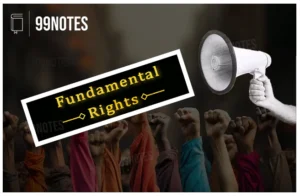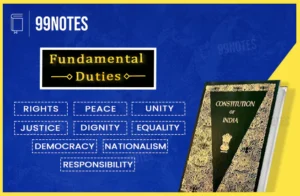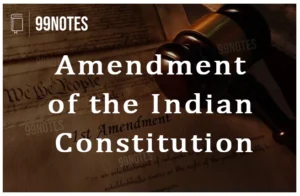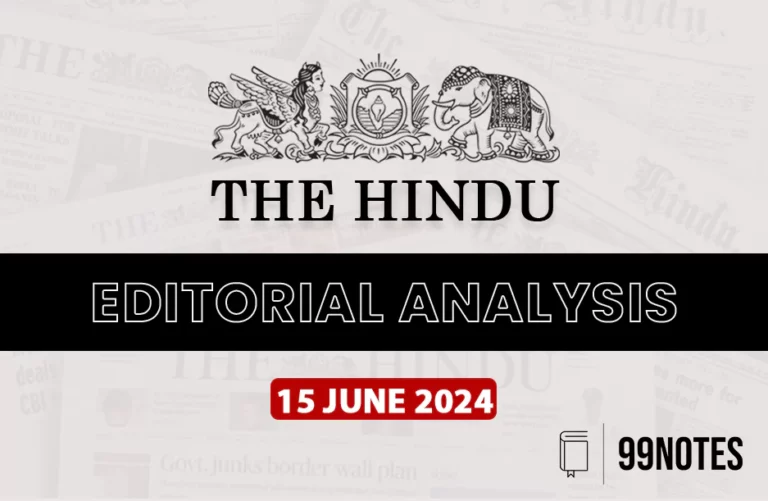11 October 2023 : The Hindu Editorial Notes PDF
The Hindu Editorial
11-October-2023
1. Women want change, society needs change
Topic: GS1, GS3 – Indian society, Gender equality
Gender gap in India
- According to the 17th edition of the Global Gender Gap Report of the World Economic Forum, it will take 131 years to close the global gender gap; it is 149 years in populous South Asian countries including India.
- Reservation is the most effective form of affirmative action and equity is the first step to equality.
- Women are not inferior to men. Incompetencies, even if they arise, are short term, and are removed soon after opportunity for skill building is made available.
- Women perform much better than men in academics, more women graduate from colleges than men, and more women enter the workforce than men.
- In contrast to this trend, the number of women sharply spirals downwards in leadership positions not because of their incompetence, but because of the hegemony of men.
Women’s Reservation Bill
- The Constitution (One Hundred Twenty-Eighth Amendment) Bill, 2023, popularly known as the Women’s Reservation Bill, 2023 became a rare piece of legislation in independent India to be cleared overwhelmingly by both Houses.
- It will reserve 33 per cent of all seats in the Lok Sabha and in state legislative assemblies for women.
- This is a ground-breaking event, as India’s founding fathers ensured that India was early to adopt universal adult suffrage, the role of women in shaping the country’s political future still remains minimal.
Challenges
- Historical evidence points out that but for a few Taleb’s black swans, all women who have assumed leadership roles did not get there by sheer industry, competence and intelligence. They were allowed only for the convenience of men who were disqualified from assuming these positions, or, if it served some political agenda.
- Historical evidence also shows that most women who make it to leadership positions have a mix of privileges — of higher education, the support of influential mentors or families, or belong to upper classes or castes.
- Despite these privileges, women also take longer to assume leadership positions.
- The deepest cut is that the handful of privileged women who assume leadership are not supportive or empathetic to the aspirations of those women who do not even have access to basic needs such as nutrition, education and financial independence.
Conclusion
- The present Bill is the first step towards actualising gender parity.
- It is time to quickly set right historical wrongs. Women want change. Society needs change. And there is no reason why it should be late.
Question: The Women’s Reservation Bill was passed by the Parliament of India in 2023. Critically examine the need for the Bill, its challenges, and its potential impact on Indian politics.
2. We need evidence-based traditional medicine
Topic: GS3 – Health sector.
Introduction
- Overview of the case involving a manufacturer of indigenous drugs and a medical practitioner.
- Raising questions about the role of traditional medicine and evidence-based medicine.
Evolution of Modern Medicine
- Historical progression of modern medicine into a science-based discipline.
- Advances in technology, surgical practices, and medical discoveries in the late 19th century.
- Development of scientific thought in the 20th century and the concept of falsifiability.
Modern Medicine: Beyond Geographic Boundaries
- Clarifying that modern medicine is not limited to a Western epistemic standpoint.
- Embracing effective therapies irrespective of their origin.
- The dynamic nature of modern medicine, characterized by continuous self-correction.
The Role of Traditional Medicine
- Highlighting the significance of traditional medical systems like Ayurveda, Unani, and Siddha in India.
- The coexistence of traditional medicine with modern scientific understanding.
- Emphasis on the need for a sound understanding of the human body in traditional systems.
Challenges in Evaluating Traditional Therapies
- Contrasting modern drug development practices, which isolate active principles, with traditional medicine’s use of combinations.
- The need to evaluate Ayurvedic therapies with modern scientific methods without compromising their holistic nature.
Evidence-Based Government Policy
- The primary goal of government policy in healthcare: improving the well-being of the population.
- The importance of basing healthcare decisions on evidence rather than nationalistic sentiments.
- The necessity of an impartial assessment of all traditional medical systems.
The Scientific Attitude
- Emphasizing the value of open-mindedness and skepticism in scientific progress.
- The risk of hasty dismissal of traditional knowledge and the cultural heritage it represents.
- The historical example of the synthesis of artemisinin, a Nobel-winning anti-malarial drug, inspired by Traditional Chinese Medicine.
Bridging the Gap
- The potential for traditional medicine and modern science to collaborate and bring valuable advancements in healthcare.
- Encouraging a harmonious integration of traditional medical practices into a comprehensive healthcare system.
Question: Discuss the role of evidence-based medicine in shaping healthcare policies and the integration of traditional medical systems into a comprehensive healthcare framework.
3. 2023 on course to be warmest year on record
Topic: GS3 – climate change
Introduction
- 2023 is on track to become possibly the warmest year in recorded history.
- Global temperatures in September 2023 hit a record high, with an average surface air temperature 0.93°C higher than the September average from 1991 to 2020.
Reasons for this change:
- Greenhouse Gas Emissions: Continued release of greenhouse gases, such as carbon dioxide and methane, primarily from human activities, trap heat in the Earth’s atmosphere, leading to global warming.
- Deforestation: Widespread deforestation contributes to higher atmospheric carbon dioxide levels, reducing the planet’s ability to absorb excess carbon.
- Fossil Fuel Consumption: The burning of fossil fuels for energy and transportation remains a major source of carbon emissions, intensifying the greenhouse effect.
- Industrial Processes: Industrial activities, including manufacturing and chemical production, release greenhouse gases and pollutants that contribute to global warming.
- Land Use Changes: Alterations in land use, urbanization, and agriculture can disrupt natural ecosystems, further exacerbating temperature rise.
- Melting Ice and Snow: The melting of polar ice caps and glaciers reduces the Earth’s albedo effect, causing more heat to be absorbed and accelerating temperature increases.
- Feedback Loops: Climate feedback loops, such as the release of methane from thawing permafrost, amplify warming effects.
- Extreme Weather Events: Increasing instances of extreme weather events, like heatwaves and hurricanes, are linked to rising global temperatures.
- Ocean Warming: Oceans absorb much of the Earth’s excess heat, leading to warmer sea surface temperatures and disrupting marine ecosystems.
- Inadequate Mitigation Efforts: Insufficient efforts to reduce emissions and transition to renewable energy sources contribute to the climate crisis.
Question: Discuss the primary factors contributing to the alarming increase in global temperatures in recent years. Provide recommendations for effective mitigation efforts.”
For Enquiry

11 October 2023 : The Hindu Editorial Notes PDF

YOJANA SUMMARY (JUNE 2023)

June Kurukshetra – Water Conservation

Yojana Magazine: July 2023

Kurukshetra July 2023: Summary

The Doctrine of Basic Structure

Fundamental Rights

Fundamental Duties

Amendment of the Indian Constitution

10 Oct 2023 : Daily Quiz
October 2023 The Hindu 11 October 2023 : The Hindu Editorial Notes PDF The Hindu Editorial
11-October-2023
1. Women want change, society needs change
Topic: GS1, GS3 –…
Yojana Summary YOJANA SUMMARY (JUNE 2023) INDIA-Gifting Holistic Well-Being to The World
DO YOU KNOW?
“This word is LiFE, which means ‘Lifestyle…
kurukshetra summary June Kurukshetra – Water Conservation During the Amrit Kaal, India is looking towards water as the future. June Kurukshetra addresses the issue…
Yojana Summary Yojana Magazine: July 2023 Chapter 1: Sahakar Se Samruddhi.
Ministry of Cooperation (MoC) for Prosperity and Progress:
Establishment…
kurukshetra summary Kurukshetra July 2023: Summary Chapter 1: Technologies for Sustainable Agriculture Development.
Introduction:
Conventional Indian agricultural…
Polity The Doctrine of Basic Structure How comprehensively can Parliament amend the Constitution? Can it change the very nature of the Constitution?…
Polity Fundamental Rights “Rights are claims of an individual necessary to ensure one’s happiness, without compromising the happiness…
Polity Fundamental Duties The idea of fundamental duty refers to a sense of moral obligations and responsibilities that an individual…
Polity Amendment of the Indian Constitution “While we want this Constitution to be as solid and permanent as we can make it, there is no permanence…
Daily Quiz 10 Oct 2023 : Daily Quiz 10 Oct 2023 : Daily Quiz…


